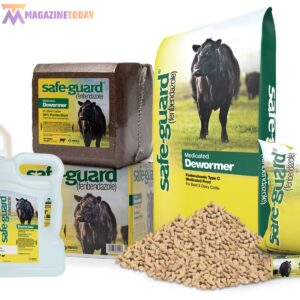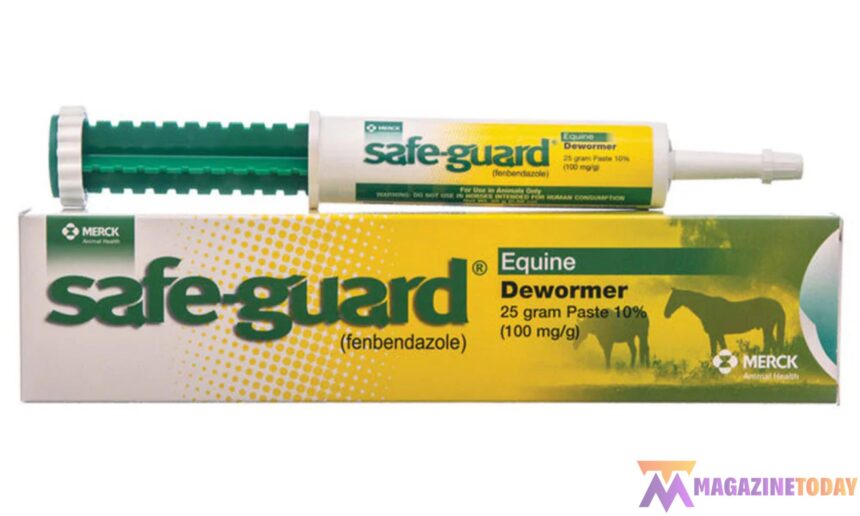When it comes to keeping your pets and livestock healthy, deworming is a critical component of their overall care. Among the most trusted and effective solutions on the market is Safeguard Dewormer. Whether you’re a pet owner, farmer, or someone responsible for animal care, this comprehensive guide will provide you with everything you need to know about Safeguard Dewormer, its benefits, how it works, and tips for proper usage.
What Is Safeguard Dewormer?
Safeguard Dewormer, also known as fenbendazole, is a broad-spectrum antiparasitic treatment designed to remove and control a wide range of internal parasites in animals. It is commonly used for pets, livestock, and even exotic animals. Safeguard Dewormer is effective, easy to use, and comes in various formulations suitable for different animals.
Key Features of This
Broad-spectrum efficacy: Targets multiple types of worms, including roundworms, hookworms, whipworms, and tapeworms.
Safe for most animals: Minimal side effects when used as directed.
Versatile application: Available in granules, paste, liquid suspension, and pellets.
Proven effectiveness:
by veterinarians and animal caretakers worldwide.
Why Is Deworming Important?
Deworming plays a crucial role in maintaining the health and well-being of animals. Parasites can cause a range of issues, from mild discomfort to severe health problems, including malnutrition, weight loss, and organ damage.
Benefits of Regular Deworming
Improved overall health: Eliminates parasitic infections, allowing animals to thrive.
Enhanced growth and productivity: Particularly important for livestock and farm animals.
Prevention of zoonotic diseases: Reduces the risk of parasites transferring from animals to humans.
Better nutrient absorption: Parasites can rob animals of essential nutrients, so deworming ensures proper nutrition.
How Does It Work?
Safeguard Dewormer contains fenbendazole, an active ingredient that disrupts the energy metabolism of parasites. This effectively kills them by interfering with their cellular functions, rendering them incapable of surviving within the host animal. Once the parasites are destroyed, they are expelled from the animal’s body through natural processes.
Types of Safeguard Dewormer Products


This is available in various formulations to meet the needs of different animals. Here’s an overview of the most popular options:
Safeguard Dewormer for Dogs
Form: Granules or liquid.
Effective Against: Roundworms, hookworms, whipworms, and tapeworms.
Usage: Mix granules with food or administer liquid directly.
Safeguard Dewormer for Cats
Form: Liquid suspension.
Effective Against: Roundworms and hookworms.
Usage: Administer orally as per veterinarian instructions.
Safeguard Dewormer for Livestock
Form: Pellets, paste, or liquid suspension.
Effective Against: Lungworms, stomach worms, and intestinal parasites.
Usage: Mixed with feed or given directly.
Safeguard Dewormer for Horses
Form: Paste or pellets.
Effective Against: Large and small strongyles, pinworms, and ascarids.
Usage: Administer orally using a syringe.
Safeguard Dewormer for Goats
Form: Liquid suspension.
Effective Against: Stomach worms and other gastrointestinal parasites.
Usage: Administer orally using a drench gun.
How to Use This Safely
Step-by-Step Instructions
- Determine the Animal’s Weight:
- Accurate dosing depends on the weight of the animal. Use a scale for precision.
- Choose the Correct Formulation:
- Select a product designed for the specific species and parasite you’re targeting.
- Follow the Dosage Guidelines:
- Always adhere to the recommended dosage on the product label or as prescribed by your veterinarian.
- Administer Properly:
- For granules: Mix with food to ensure the animal consumes the full dose.
- For paste: Use the provided syringe to administer the correct amount orally.
- For liquid: Measure carefully and give as directed.
- Monitor the Animal:
- Observe for any side effects or signs of discomfort after administration.
- Repeat as Necessary:
- Some parasites require multiple treatments. Follow your vet’s advice for follow-up doses.
Common Questions About Safeguard Dewormer
Is Safeguard Dewormer Safe for All Animals?
Yes, this is generally safe for most animals when used as directed. However, consult your veterinarian before administering it to pregnant, nursing, or young animals.
How Often Should I Deworm My Pet?
The frequency depends on the animal’s age, environment, and risk of exposure to parasites. As a general rule:
Puppies and kittens: Every 2–3 weeks until 12 weeks old.
Adult pets: Every 3–6 months.
Livestock: As recommended based on herd health management.
Can I Use Safeguard Dewormer Without a Prescription?
This is available over-the-counter, but it’s always best to consult your veterinarian for proper diagnosis and dosage.
Are There Side Effects of Safeguard Dewormer?
Side effects are rare but may include mild gastrointestinal upset or lethargy. If symptoms persist, seek veterinary advice.
Does Safeguard Dewormer Protect Against Fleas?
No, this is designed to target internal parasites. Use a separate flea prevention product for external parasite control.
Tips for Effective Deworming
- Maintain a Clean Environment:Regularly clean living areas to minimize parasite exposure.
- Practice Routine Monitoring:Conduct regular fecal tests to detect parasites early.
- Implement a Deworming Schedule:Work with your vet to establish a customized deworming plan.
- Combine with Other Preventive Measures:Use flea and tick preventives alongside dewormers for comprehensive protection.
The Importance of Veterinary Consultation


While this is a powerful tool in parasite control, it’s important to involve your veterinarian in the process. A vet can:
Diagnose specific parasites.
Recommend the correct product and dosage.
Monitor your animal’s health and response to treatment.
Where to Buy Safeguard Dewormer
This is widely available at:
Veterinary clinics.
Pet supply stores.
Online retailers like Amazon and Chewy.
Tips for Purchasing Safeguard Dewormer Online
Choose Trusted Retailers: Ensure the seller is reputable.
Check Expiration Dates: Always verify the product’s expiry date.
Compare Prices: Look for discounts or promotions to save money.
FAQs
1. Can it be used on exotic pets?
Yes, but consult a veterinarian experienced with exotic animals for proper dosing and usage.
2. How long does it take for Safeguard Dewormer to work?
It typically starts working within 24–48 hours, but complete elimination of parasites may take a few days.
3. Can I use it for multiple animals?
Yes, but ensure you administer the correct dosage for each animal based on their weight.
4. Does Safeguard Dewormer require refrigeration?
No, store it at room temperature away from direct sunlight.
5. What should I do if I miss a dose?
Administer the missed dose as soon as you remember, but avoid doubling the dosage.
By integrating Safeguard Dewormer into your animal care routine, you can create a healthier, happier environment for your pets and livestock.
Conclusion
Safeguard Dewormer is a trusted and effective solution for controlling internal parasites in pets and livestock. Its versatility, safety, and proven results make it a must-have for animal care. By following proper usage guidelines and consulting your veterinarian, you can ensure the health and well-being of your animals for years to come.
Keep your furry friends and livestock parasite-free with this, and enjoy the peace of mind that comes with knowing they’re in excellent health.






